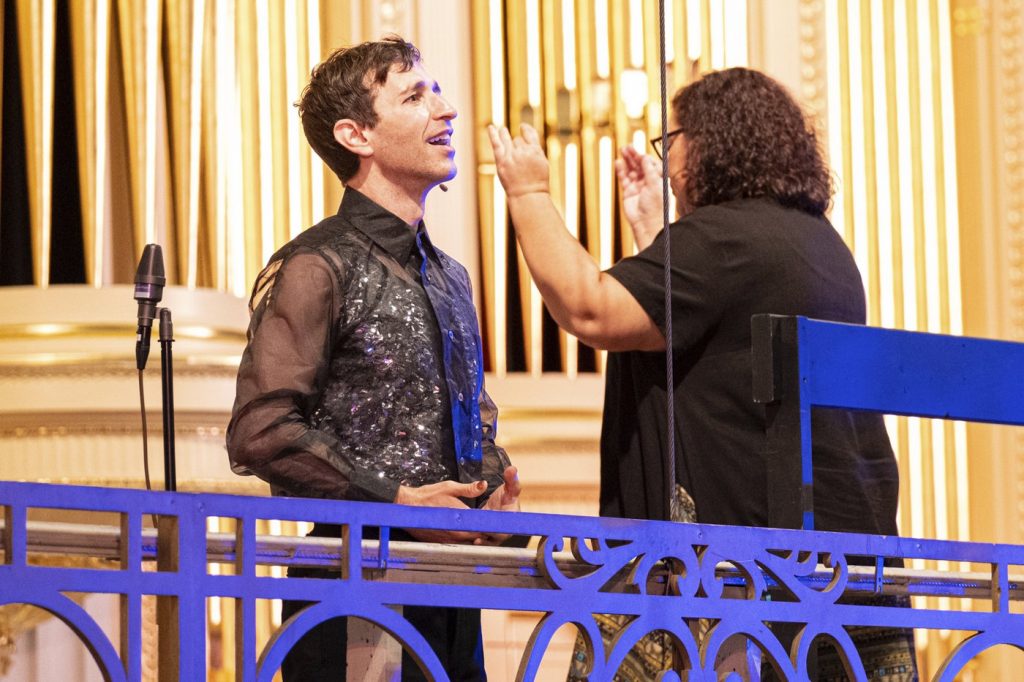Anthony Roth Costanzo, the general director of Opera Philadelphia, is poised to captivate audiences with innovative offerings during the company’s 50th anniversary season. This season marks Costanzo's first opportunity to shape the programming since he took the helm of the previously struggling organization last year, which was on the brink of bankruptcy. Under his leadership, the company is aiming to redefine the typical opera experience.
Costanzo has set out to surprise audiences by revealing the season's theme: "Opera, but different." Kicking off the new season, he has selected the lesser-known work by Rossini, "Il viaggio a Reims," which debuts on Friday. In a notable departure from traditional opera settings, director Damiano Michieletto has transformed the backdrop from an inn to an art gallery, where the portraits interact with the audience through song.
The upcoming season promises a variety of adventurous performances. Alongside the Rossini piece, a multimedia production featuring playwright Sarah Ruhl’s work set to Vivaldi’s music, including "The Seasons," will star Costanzo himself, who is also an accomplished countertenor. Following that, the company will showcase a world premiere with a libretto by Pulitzer Prize-winning writer Michael R. Jackson and music from ten different composers. Another opera by Gregory Spears will highlight the chorus in a starring role, while bass-baritone Davóne Tines will present a "vaudevillian rendering" of a poem by Langston Hughes.
Costanzo's excitement about the upcoming performances is rooted in the financial turnaround he has facilitated. When he assumed leadership, the company needed to raise $4 million to avoid bankruptcy. To bring in funds, he implemented a "pick your price" ticket policy, allowing patrons to purchase tickets starting at just $11. This strategy not only aimed at increasing ticket sales but also engaged a broader audience demographic, particularly targeting younger individuals who may have never attended an opera before.
The response to the new pricing structure was overwhelmingly positive. The initiative generated enthusiasm and goodwill, leading to a remarkable $7 million in donations, effectively eliminating the company's debt. Following the launch of the 2024-25 season, three operas sold out within three weeks, and the company reported a budget surplus of $2.4 million. This success was further illustrated during the season-opening performance of "The Listeners," by Missy Mazzoli, where the audience's enthusiastic response was palpable.
Among the audience members who embraced the new pricing model was Helen Little from New York City, who praised it as a "brilliant idea" for making opera more accessible. She noted that ticket prices only cover a fraction of the operating costs for an opera, but fostering good will and attracting new demographics was invaluable. Encouragingly, two-thirds of ticket buyers utilizing the pick-your-price option had never purchased tickets from Opera Philadelphia before, highlighting the initiative's effectiveness in expanding the audience base.
As a result of the improved finances, this season will feature double the number of performances compared to the previous year, though the overall budget remains significantly lower than in 2017, when the company experimented with an ambitious festival format. Costanzo explained that the decision to set the ticket price at $11 was strategic; while he initially considered $25, he wanted to offer something unique that would stand out in the competitive market.
Marc Scorca, president and CEO of Opera America, is keenly observing the developments at Opera Philadelphia. He emphasizes that while the company has made bold moves, it is still early to determine the long-term success of such initiatives. He noted that the experience gained from these strategies might provide crucial insights for both Opera Philadelphia and the wider field.











